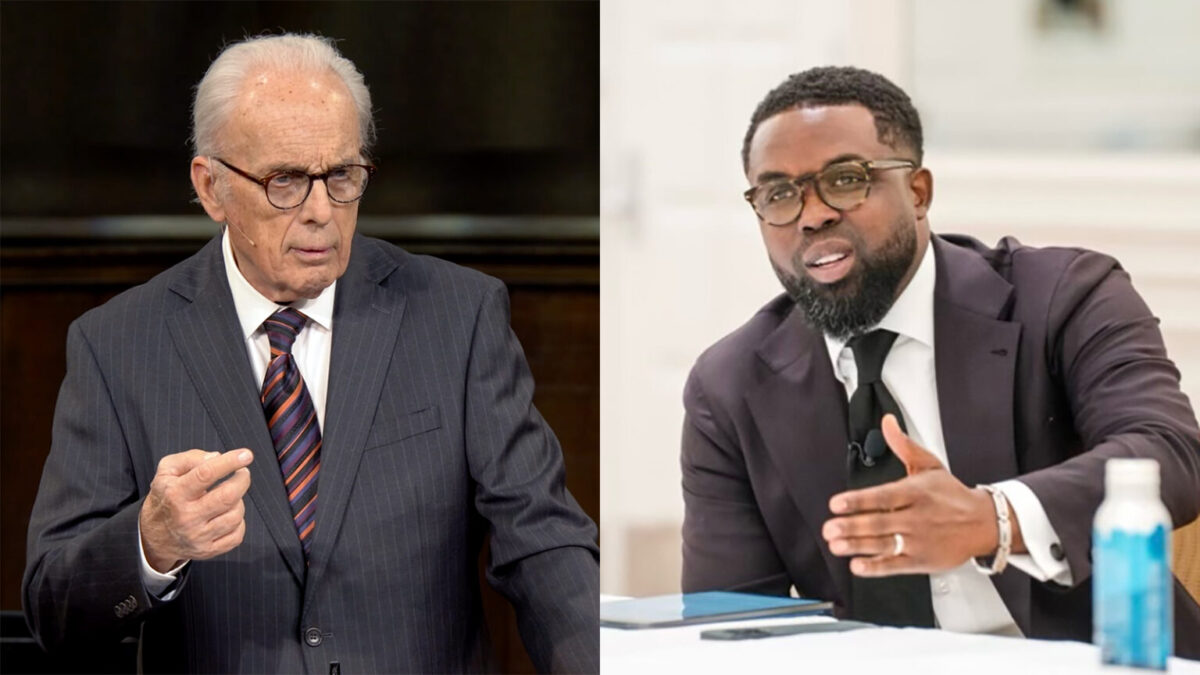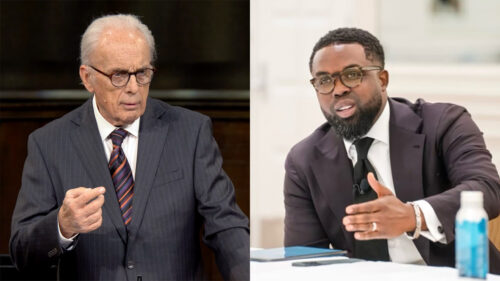
(RNS) — The Rev. Charlie Dates, the pastor of two historically Black churches in Chicago, is defending the Rev. Martin Luther King Jr. after California pastor John MacArthur declared in February that the civil rights leader “was not a Christian at all.”
“We, the undersigned, regret that we have to write you this way, but we sense that this is the only way to address the egregious wrong that you — and those like you — have yet again inflicted on Black Christians in America,” Dates wrote in an open letter that appears on the website of his Progressive Baptist Church in Chicago.

Pastor John MacArthur, left, and the Rev. Charlie Dates. (Left: video screen grab; Right: photo by Denis Contreras)
“Undoubtedly, you, Mr. MacArthur, have made significant and helpful contributions to the reading and understanding of scripture for our present age. How ironic it now feels to write to you, a teacher, a word of correction. We hope that you will find within this missive a patient and reasonable rebuttal for your unwise and ill-timed slander of the Rev. Dr. Martin L. King, Jr.”
The controversy reflects the lines that have been drawn in disputes among Reformed Christians and other Christian groups over issues related to race or social justice.
MacArthur’s comments were made during a question-and-answer session at Grace Community Church in Sun Valley, California, where he is the longtime pastor. He was asked what he thought of two influential evangelical groups, Together for the Gospel and The Gospel Coalition, which have been popular with Reformed Christians like those in MacArthur’s congregation.
After noting that Together for the Gospel had held a tribute to Reformed theologian R.C. Sproul shortly after his death in 2017, MacArthur added, “And the strange irony was a year later they did the same thing for Martin Luther King, who was not a Christian at all, whose life was immoral,” he said in a video posted on X, formerly Twitter, in February. “I’m not saying he didn’t do some social good. And I’ve always been glad that he was a pacifist, or he could have started a real revolution.”
The Gospel Coalition, he said, was once a good organization but is now “useless” and “woke,” said MacArthur. “It’s Christianity astray,” he said — referring to a satirical nickname for Christianity Today, an evangelical magazine MacArthur has disapproved of in the past.
A spokesman for The Gospel Coalition did not respond to a request for comment.
MacArthur has been at odds with The Gospel Coalition since 2018, when that group helped sponsor a major conference in Memphis, Tennessee, commemorating the 50th anniversary of the death of Martin Luther King Jr. and condemning racism and its negative effects on the life of the church. At the event were prominent leaders, including Dates, Reformed preacher and author John Piper, Texas megachurch pastor Matt Chandler, then-SBC ethicist Russell Moore, and community organizer John Perkins. (Both Perkins and Piper are longtime friends of MacArthur.)
The 2018 conference led MacArthur and others to draft a statement on social justice — which warned against what he called dangerous ideas about race and justice. That statement helped launch the so-called “war on wokeness” that has polarized both churches and the broader culture.
Reacting to MacArthur’s recent statements, Justin Giboney, president of the nonprofit AND Campaign, who also spoke at the 2018 MLK50 Conference, wrote an essay in Christianity Today critiquing MacArthur’s stance on King.
In an interview, Giboney said that his organization, a nonpartisan think tank that promotes Christian civic engagement, supports Dates’ open letter. He added that MacArthur’s comments about King reflect a wider “culture-war dynamic” in which some try to “take down all the heroes” of social justice.
After learning of MacArthur’s recent comments, Dates, who also is pastor of Salem Baptist Church of Chicago, said in a sermon, part of which was posted on Instagram on Feb. 26: “I’m so angry I could cry.”
He noted in his open letter that MacArthur had chosen to make his remarks during Black History Month. And in a later post on Instagram, Dates said: “Pastor MacArthur, You won’t do this to Dr. King … and you won’t disrespect millions of Christians without account.”
In an interview on Monday (March 18), Dates said, “He cannot get away with this. He has to know that Black and Black-adjacent clergy around the country wholeheartedly disagree with him on theological grounds. He’s not the keeper of who’s Christian and who’s not.”
In the past, MacArthur sought to align himself with the ideals of the Civil Rights Movement.
Phil Johnson, the executive editor of Grace to You, MacArthur’s media ministry, said that the pastor is not giving interviews or taking any additional questions about King. But Johnson drew a distinction between King’s work on civil rights and his doctrinal beliefs or conduct.
“As John MacArthur mentioned in his recent comments, he believes much of Dr. King’s work in the realm of Civil Rights, voting rights, and equal treatment for all ethnicities was good and beneficial,” Johnson wrote in an email.
Johnson added that MacArthur has long been critical of King on a doctrinal level. King’s “doctrine and morals do not make him a model Bible-believing (person) Christians should seek to emulate,” Johnson said. “That should not really be controversial to anyone familiar with the record of his private life and beliefs.”
MacArthur’s comments echo similar comments by other conservative leaders dating back to the 1960s. During the Civil Rights era, Christianity Today ran a series of essays from then FBI director J. Edgar Hoover, who dismissed the work of King and other Black leaders as communist rather than Christian.
In the open letter, Dates invokes both Hoover and the segregationist Alabama Gov. George Wallace, calling MacArthur “them in postmodern dress.”
The letter closes with a statement of plans to boycott MacArthur’s work: “Perhaps we should tell you that we are calling on Christian Clergy of all colors to stop reading your commentaries, to dislodge themselves from your conferences, and to give your voice no amplification in their teaching until you fight for justice to roll down like a river in America and righteousness like a mighty stream for those who are marginalized.”






